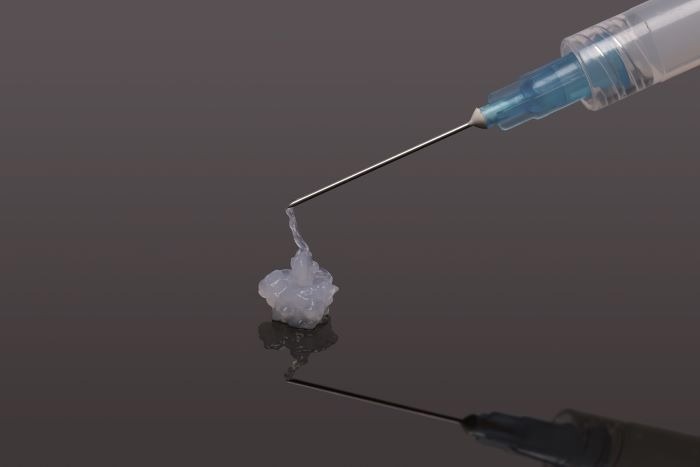UPM Biomedicals, the forerunner in producing high quality nanofibrillar cellulose for medical and life science applications, today announces the launch of FibGel™—a natural injectable hydrogel for permanent implantable medical devices. FibGel is a nanofibrillar cellulose hydrogel made from birch wood cellulose and water only, offering a safe, sustainable and biocompatible alternative for medical device developers. Designed and manufactured under ISO 13485 standards in Finland and designed for medical applications, FibGel is poised to transform the fields of soft tissue repair, orthopedics, regenerative medicine and more.

Image Credit: UPM Biomedicals
Unlike synthetic and animal-derived hydrogels, FibGel is a natural hydrogel— manufactured from renewable and responsibly-sourced Finnish birch wood—offering a safe, sustainable, animal-free solution. As a stable, non-degradable material, FibGel is designed for long-lasting use in the human body without causing adverse immune reactions or the formation of fibrotic capsules common to animal-derived and plastic-based alternatives.
FibGel is customizable owing to its tunable properties that allow adjustable stiffness and the incorporation of additional components. This flexibility enables tailored solutions for varying clinical needs and holds promise in a wide range of medical applications, including soft tissue repair, orthopedic treatments, aesthetics, drug delivery, and cell transplantation. With FibGel’s biological safety evaluations in accordance with ISO 10993, it is an ideal component for companies developing medical devices for use in various soft tissue repair and orthopedic applications. The company’s first partners are planning initial clinical investigations based on FibGel technology in 2025.
UPM has extensive expertise in developing sustainable, animal-free hydrogels and rigorous testing has demonstrated FibGel’s biocompatibility. Based on the preclinical studies, its stability supports permanent implant and one-time injection applications, critical for patient convenience and saving health care providers’ time. FibGel is highly tunable, easy to use and remains injectable even at high stiffness thanks to its shear thinning properties.
“We are thrilled to be the first company to develop plant-based nanocellulose for use in medical devices. It enables minimally invasive procedures, which compared to surgery means rapid patient recovery” commented Johana Kuncová-Kallio, Director of UPM Biomedicals. “In 2020 we launched our own FibDex® topical medical device (MDD/MDR, class IIb) for advanced wound care, which has been used to successfully treat hundreds of patients. Now, with the launch of FibGel, we can provide the same safe, sustainable, animal-free material in an injectable hydrogel form to medical device companies. Based on our pre-clinical evidence for FibGel, our initial partners have been able to speed up their device development and are now planning to start the clinical phase in 2025. We aim to partner with more companies interested in developing new solutions in the areas of soft tissue repair, joint and disk repair, wound care, drug delivery and cell therapy based on FibGel technology.”
FibGel also benefits from robust temperature stability, enabling it to be handled and stored at room temperature for ease of use and quick preparation. It’s long 18-month minimum shelf life delivers reliable performance without special storage conditions, reducing logistical challenges.